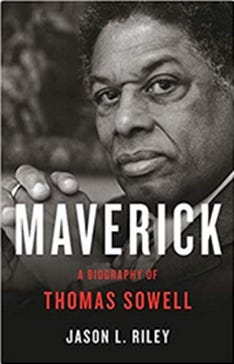Most biographies center on the subject’s life story – where they came from, what life events impacted them, and where they ended up. But not this biography. This type of biography could only be written about a person so impactful in their thinking that they deserve and entire biography about only their intellectual contributions.
That person is Thomas Sowell.
I’ve known of Thomas Sowell for quite some years and have read a couple of his books (his most recent two). But the man has written over 40 (!) books on diverse topics, from economics, decision making, education, and race. He is the exemplar of what a public intellectual should be: unapologetic, honest, and accessible.
In Maverick: A Biography of Thomas Sowell, Jason L. Riley takes the reader on an intellectual journey of Sowell’s astounding and prolific intellectual career (that’s still ongoing by the way). An economist by training, Sowell has made contributions to a variety of areas of importance, including, of course, on economic issues such as minimum wage laws (and argues that they only out-price young minority workers out of jobs), education and affirmative action policies (being unapologetically against them), and socioeconomic mobility of minority groups in America (focusing on the cultural differences among groups and being firmly against hereditarian hypotheses of IQ).
Sowell is also a great example of transformation of thinking in the political and policy realm as a function of his work and critical analysis of issues. A self-identified Marxist in his early years, his work has led him on a path toward conservatism (in a more classical sense, not a Turmpian one).
But what I found most fascinating about Sowell is that he left academia (teaching in particular) decades ago because of the meddling and policy decisions of education leaders. Issues that are much the same as those plaguing higher education today. Its as if the “crisis” of higher education is the permanent state of higher education now. Since his academic departure, Sowell has been a scholar at the Hoover Institution at Stanford University where he has spent decades writing his numerous books.
In his long-term role as a public intellectual, it is arguable that he has had a far greater impact on society than he would have had he stayed in academia, taught classes, and mentored graduate students. It is remarkable the reach and influence his writings have had, precisely because of the accessibility of his writing. He is data-driven without being intimidating. He speaks in plain language. And he is more concerned with readers understanding his ideas than of fluffing his own ego or appeasing others.
Maverick was a truly enjoyable book, and one which motivates me to devour as many of Sowell’s readings as I can (I’ll have to be choosy, given that he’s written so many books!). I listened to this one on audio and the performance of Brad Sanders really makes the work come alive. Highly recommend!
Published: May 2021
Format: Audio
If you think this sounds interesting, bookmark these other great reads:
Woke Racism: How a New Religion Has Betrayed Black America by John McWhorter (2021)
Discrimination and Disparities by Thomas Sowell (2019)
This post contains affiliate links, allowing me to earn a small commission when you purchase books from the link provided. There is no cost to you, and this will allow me to keep this newsletter free and open to all. Happy reading!






Sowell is one of those scholars I want to have read but he's got somuch material out there I'm lost as to where to begin.
I think I'll start with this biography and work my way backwards.